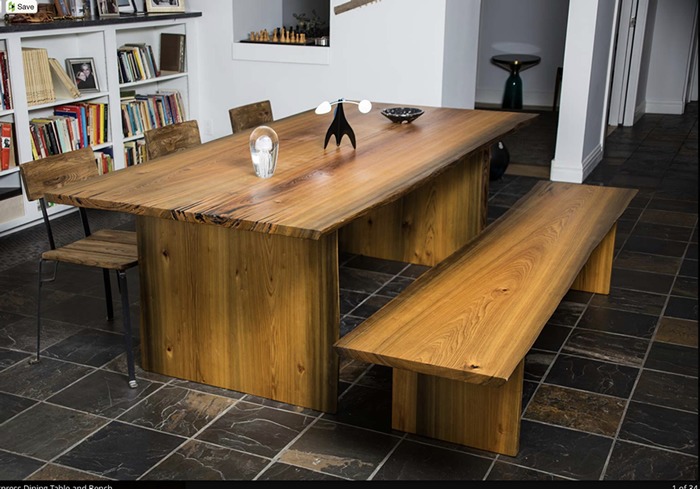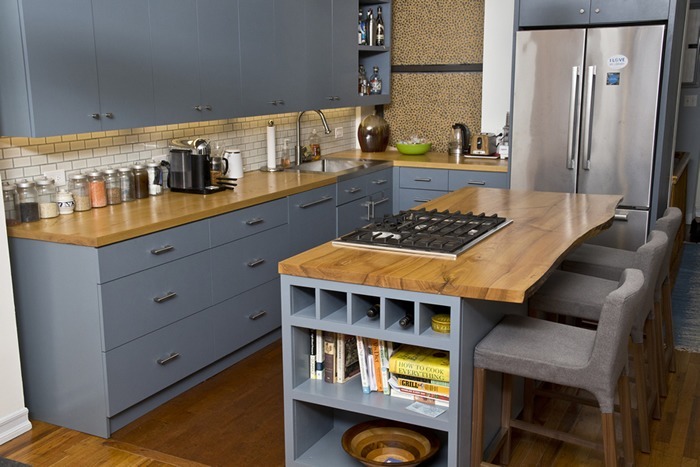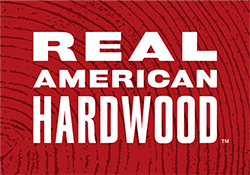Live-edge hardwood, in which the sides of the slab are left unmilled so that the natural profile of the tree trunk is retained, is an increasingly popular decorative trend in today’s residential interiors. The technique is not only used for pieces of stand-alone furniture such as tables and benches but also for built-in elements like shelving, mantles, counter tops, bars, and kitchen islands.
“Most mills cut off the rough tree edges turning the raw timber into neat boards,” says Linda Jovanovich, of the American Hardwood Information Center. “But the current demand for live-edge slabs has led to a small but vigorous subset of producers who specialize in the category.” These are often boutique businesses that source, dry, and mill limited batches of timber for use in furniture of their own design and manufacture.
“Some larger sawmills, sell live-edge slabs to the public,” Jovanovich continues. “You visit their showroom and pick your own one-of-a-kind piece of ash, cherry, red oak, walnut, or whatever other hardwood species they have in stock. A cabinetmaker can then custom-make a piece of furniture or a built-in feature to your exact specifications.”
Sustainability-minded entrepreneurs are responsible for another niche in the live-edge hardwood market: Small urban suppliers that source culled or fallen trees from the backyards of private homes, public parks, graveyards, and other leafy locations in their city and its immediate environs. One such enterprise, RE-CO BRKLYN in Brooklyn, New York, recently harvested four 12,000-pound logs from a 150-year-old storm-felled elm in nearby Prospect Park. The logs were taken to an upstate mill to be sawn into live-edge slabs and dried before being shipped back to Brooklyn, where they were either sold or used by RE-CO for tables, desks, bar counters, shelves, headboards, and other beautiful custom-made pieces it produces.

Milled from long-submerged cypress logs, RE-CO BKLYN used live-edge slabs of sinker cypress, to make a handsome dining table and matching bench.
“It was George Nakashima, the legendary Japanese-American mid-century furniture maker, who pioneered the use of live-edge slabs in refined residential settings,” says New York–based designer Glenn Gissler. “Previously, untrimmed wood planks, sometimes with the bark still intact, were used for rustic, log-cabin, or ranch-house effects—elements that referenced the traditions, myths, and aesthetics of the American Old West. With his gorgeous large-scale pieces, comprising multiple slabs of characterful woods like walnut and cherry connected with butterfly joints, Nakashima showed us how unfinished natural edges and richly figured knotted surfaces fit perfectly into even the most sophisticated urban interiors.”

A single ash tree, sourced from a suburban yard by RE-CO BKLYN, supplied the live-edge counter and island tops in this kitchen.
Today, original Nakashima pieces are highly collectible and command high prices at auction. But his free-edge aesthetic is more influential than ever as homeowners discover the ability of live-edge furniture to work with almost any decorative style. Paired with blackened-steel legs, for example, a live-edge slab of burled walnut creates a dining table with loft-worthy industrial chic. Fixed to the bedroom wall, a free-form expanse of warm-toned cherry provides a romantic headboard. Or a hefty live-edge slab of oak, supported on an equally hefty oak-slab base, makes for a monumental console with the presence of a piece of archaic sculpture. New York–based designer Laura Bohn has even used the chainsawed cross-section of an elm trunk—complete with its bark—as a countertop in which to mount a stainless-steel powder-room sink. “It introduces a decidedly rustic note into a thoroughly modern space,” she says. “And yet it looks perfectly natural, as if it had just grown there of its own accord.”


